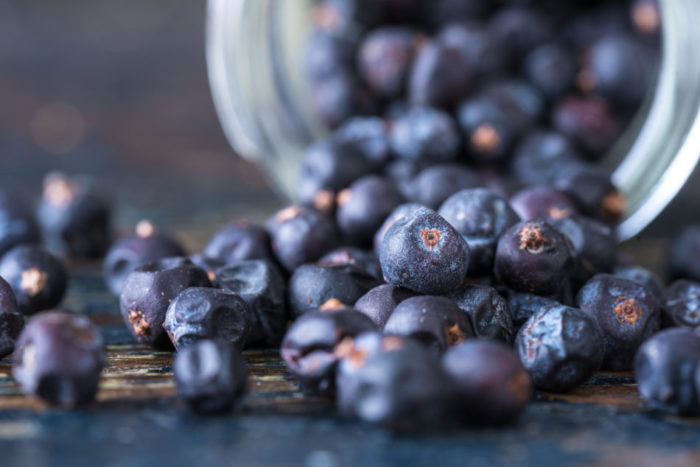
Juniper berries may look like blueberries and sound like it but this plant is consumed very differently. It is used as a spice or flavoring to bring some zing to certain recipes. You might find it hard to get this rare spice so we’ve gathered some juniper berry substitutes that you can use for pretty much the same dishes.
For your reference, some of the common culinary uses for juniper berries include stews, roasts, marinades, brines, meat recipes, braised dishes, and fermented foods.
This ingredient is especially well known in Northern European cuisine so if your dish is inspired by this cooking style then you’d be needing this juniper berry or the next closest thing to it.
Try out these juniper berry substitutes in your next cooking
1. Gin
Don’t be surprised that the first in this list of alternatives for juniper berry is gin. This alcohol is characterized by its flavor of juniper berries. So, if you need something really close to the real thing in terms of taste, you can use gin.
Gin has a complex flavor that goes great in many dishes including pasta, poultry, and fish. You can also use it in baking or making desserts. It’s a rather efficient sub for juniper berries.
In case you’re worrying about the alcohol content, the alcohol would pretty much evaporate if you’re cooking a recipe in high heat or for a long time. So, you’re left with just the taste of juniper berry in your dish.
You can replace a teaspoon of gin for two juniper berries.
2. Rosemary
Fresh and highly fragrant, rosemary is an herb that works as the next best thing to juniper berry. The two have a similar flavor and scent profile so you can use both for similar dishes.
Rosemary works especially well in meats like steak, roasted pork, boar, or venison. Its aroma and taste complements the meaty taste so it results in a more balanced savory dish.
You can use one fresh sprig of rosemary to replace about 4 juniper berries or about 3 sprigs of rosemary for a teaspoon of juniper berries.
3. Bay leaf
With a comparable spicy warm aroma, bay leaf is a good alternative for juniper berry.
This herb is an excellent flavoring to soups, stews, braises and other savory dishes. It’s usually removed from the cooked food after its taste and aroma is infused in the recipe. You can also use it for marinating meat and fish.
Use 1-2 whole bay leaves for 4 juniper berries in your dish.
4. Star Anise
Especially popular in Southeast Asian cuisine, star anise is used the same way as bay leaves. The two share similar culinary use and both are effective subs for juniper berries.
Star anise is used often in Chinese cooking because of its warm, sweet taste and great aroma.
Try using this spice in stews, soups, braises and savory dishes. You can start with 1-2 pods in a dish. In place of juniper berries, two pieces of the seeds can be replaced with a teaspoon of ground star anise.
5. Caraway Seeds
With a full-bodied flavor, this spice works wonders in both savory and light dishes. It’s another thing you can use when you can’t get juniper berries.
Caraway seeds are often used in European dishes. It adds more depth in taste for breads, cakes, and biscuits. Its nutty, bittersweet taste with notes of pepper, anise, and citrus works great in meat dishes, stews, and pickled dishes like sauerkraut.
When using caraway seeds, you can use a teaspoon of this spice in place of about 2 juniper berries.
6. Cardamom
In a pinch, you can also use cardamom for a variety of dishes needing juniper berries. This spice comes in varied colors including black, green, and white which is a bleached form.
Cardamom is a versatile spice typically used in Asian and Middle Eastern cuisine. Now, it’s already made its way to various cooking styles Scandinavian, Arabic, and Swedish to name a few.
You can use cardamom in savory dishes like curries, stews, meat dishes or even in baked goods like gingerbread cookies, bread, sweet rolls, and pies. You can use a teaspoon of caraway seeds for 2 juniper berries.
7. Hickory Spice
A combination of herbs and spices, this can also serve as an alternative to juniper berries. This seasoning will help improve your recipes’ taste and aroma.
Hickory spice is a blend of onion, garlic, salt, ground chiles, cumin, and hickory powder. There are different mixtures depending on brand or homemade preferences but basically, this seasoning is made with a combination of spices.
With a salty, sweet, and mildly spicy flavor, hickory spice seasoning is used in salad dressings, marinating and flavoring meats, and cooking vegetables. Replace a teaspoon of juniper berries with a teaspoon of this spice. If you want your dish to be spicier, feel free to add a bit more.
8. Black Pepper
Probably the easiest spice to acquire wherever you are, black pepper can also save your meal when there’s no juniper berry in sight.
Black pepper is one the all-around spice professional chefs or home cooks would have in the kitchen. This ingredient offers a warm spicy taste to a dish and brings a delicious herbaceous aroma.
Dubbed as the ‘king of spices’, you can definitely use it to replace juniper berries for your broths, brines, soups, stews, meats, and veggie dishes. First use half a teaspoon of black pepper for a teaspoon of juniper berries and slowly add more according to your preference.
9. Juniper extract
Much like gin, this extract is also a doable sub for juniper berries. It may also be difficult to avail this product but you can use it for a long time.
Juniper extract is used in a variety of things including foundation, lipstick, bubble bath, hair conditioners, etc. If you’re in a store, it’s better to not get this product if it’s lined up along the cosmetic section if you will use it for cooking. Make sure you get a food grade bottle of juniper extract you can for your cooking.
To replace juniper berries, just add a few drops of this extract to your recipe.
Related FAQs
What are similar to juniper berries?
Depending on what you base it on, many things can be similar to the spicy seed cone. Gin and juniper extracts are basically the same with juniper berries if you consider their base ingredient. In terms of function and flavor profile, spices like rosemary and cardamom have similarities.
What do juniper berries taste like?
The juniper berries may look so much like blueberries but they are not sweet and juicy like the tiny fruits. These seed cones have a strong flavor. It has a touch of piney taste, with a balance of mild fruitiness and notes of pepper. It is spicy with some sweetness and bitterness to it.
Where can I buy juniper berries?
You would most likely find it in the spices section in grocery stores or in your local spice shops.
Final words
Don’t get disheartened if you find an appealing recipe with juniper berry listed in its ingredients. It may be an unfamiliar spice but it would be great to try it out for yourself. If you can’t be bothered with buying and using this, then try out the various juniper berry substitutes we’ve listed above.
Happy cooking!
